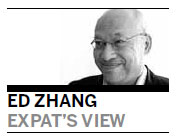Government promises more micro flexibility
Updated: 2013-05-06 07:13
By Ed Zhang (China Daily)
|
||||||||

The most significant latest development was no doubt the Political Bureau's standing committee meeting to review the economy's performance in the first quarter. It took place on April 25, shortly before the May Day holiday. Most people worked for only two days last week.
For the first time in China, the top leaders proposed (from the Politburo meeting) a three-pronged guideline. It is, translated roughly, to keep steady in macroeconomic policies, to be more flexible with microeconomic policies and to guarantee the bottom line in social policies.
The most noticeable part of it is the acknowledgement that the government should become more liberal in day-to-day business administration, or that, to put it another way, the government's present way of looking after the economy remains unhealthily stiff.
On Friday, the central television network CCTV reported that, as business registration rules were made easier in Shenzhen, one of the country's special economic zones to pioneer reform, local residents lined up from early morning to register their new business ventures.
The change was, to be sure, not a big deal. It would not incur a major cost from the government, or compromise its general power over the economy, in just relieving the applicants for registration of the need to show immediate capital deposits and a few papers it takes time and even long-distance journeys to obtain. But small as it is, the change has obviously produced a profound social impact.
A lack of small businesses, especially those in various service trades, and a lack of competition for those that do exist, is easily spotted in Chinese cities. Difficulties in getting an inexpensive quick lunch or waving down a taxi are classic cases in big cities, despite the municipal officials' repeated pledge to fix the problems.
Indeed, without many seemingly small but practically important changes showing flexibility on the microeconomic level, it would be hard to imagine how the country's ambitious urbanization program would succeed without helping at least 200 million migrant workers and their families completely settle down in the cities.
Using urbanization as a new engine to drive China's economic growth is a point that Premier Li Keqiang has repeatedly made. The practical snarl up, however, is that his team has only been lined up for six weeks and problems to prevent private initiatives, such as the impossible hassle faced by business registration applicants in Shenzhen in the past, still abound in many details in society.
Making the country's whole economic machine inclusive and flexible takes a major effort. And before the confidence and activity among citizens is rekindled by the changes that the top leaders have promised in flexibility, the economy can probably only continue to show the kind of lackluster progress that people are inferring from the latest data.
Those data are far from indicating an economy heading toward a ditch. But they are not pretty either. GDP growth was 7.7 percent year-on-year in the first quarter, as compared with 7.9 percent in the fourth quarter of 2012.
The official manufacturing PMI was 50.6 in April, lower than March by 0.3 of a point.And the official non-manufacturing (mainly services) PMI, as released on Friday, was 54.5 in April, lower than March by as much as 1.1 points. Local governments' debts have been piling up at the same time, as a lot of money was borrowed to re-finance their incomplete projects.
It appears the economy cannot yield much greater efficiency by relying primarily on administratively driven growth any longer.
Contact the writer at edzhang@chinadaily.com.cn
(China Daily 05/06/2013 page20)

 Michelle lays roses at site along Berlin Wall
Michelle lays roses at site along Berlin Wall
 Historic space lecture in Tiangong-1 commences
Historic space lecture in Tiangong-1 commences
 'Sopranos' Star James Gandolfini dead at 51
'Sopranos' Star James Gandolfini dead at 51
 UN: Number of refugees hits 18-year high
UN: Number of refugees hits 18-year high
 Slide: Jet exercises from aircraft carrier
Slide: Jet exercises from aircraft carrier
 Talks establish fishery hotline
Talks establish fishery hotline
 Foreign buyers eye Chinese drones
Foreign buyers eye Chinese drones
 UN chief hails China's peacekeepers
UN chief hails China's peacekeepers
Most Viewed
Editor's Picks

|

|

|

|

|

|
Today's Top News
Shenzhou X astronaut gives lecture today
US told to reassess duties on Chinese paper
Chinese seek greater share of satellite market
Russia rejects Obama's nuke cut proposal
US immigration bill sees Senate breakthrough
Brazilian cities revoke fare hikes
Moody's warns on China's local govt debt
Air quality in major cities drops in May
US Weekly

|

|







